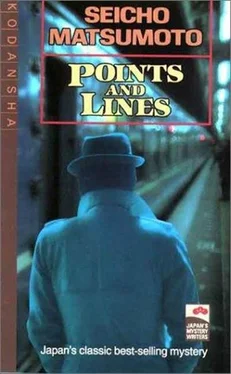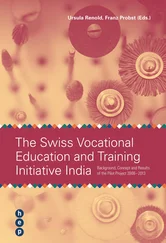Seichō Matsumoto - Points And Lines
Здесь есть возможность читать онлайн «Seichō Matsumoto - Points And Lines» весь текст электронной книги совершенно бесплатно (целиком полную версию без сокращений). В некоторых случаях можно слушать аудио, скачать через торрент в формате fb2 и присутствует краткое содержание. Жанр: Детектив, на английском языке. Описание произведения, (предисловие) а так же отзывы посетителей доступны на портале библиотеки ЛибКат.
- Название:Points And Lines
- Автор:
- Жанр:
- Год:неизвестен
- ISBN:нет данных
- Рейтинг книги:5 / 5. Голосов: 1
-
Избранное:Добавить в избранное
- Отзывы:
-
Ваша оценка:
- 100
- 1
- 2
- 3
- 4
- 5
Points And Lines: краткое содержание, описание и аннотация
Предлагаем к чтению аннотацию, описание, краткое содержание или предисловие (зависит от того, что написал сам автор книги «Points And Lines»). Если вы не нашли необходимую информацию о книге — напишите в комментариях, мы постараемся отыскать её.
Points And Lines — читать онлайн бесплатно полную книгу (весь текст) целиком
Ниже представлен текст книги, разбитый по страницам. Система сохранения места последней прочитанной страницы, позволяет с удобством читать онлайн бесплатно книгу «Points And Lines», без необходимости каждый раз заново искать на чём Вы остановились. Поставьте закладку, и сможете в любой момент перейти на страницу, на которой закончили чтение.
Интервал:
Закладка:
"Without wings," he muttered to himself, "Yasuda couldn't possibly be in Hokkaido at that hour." Suddenly, he missed his step and fell on the stairs. The stairwell was brightly lighted.
He stifled a cry. Why hadn't he thought of it before? His ears were ringing. Picking himself up, he ran back to his office. He found the timetable and quickly turned to the back pages. This was the section reserved for Japan Airlines. His hands were unsteady. He read the flight schedule for the month of January:
Fukuoka 8:00A.M…Tokyo 12:00P.M. (Flight No. 302)
Tokyo 1:00P.M…Sapporo 4:00P.M. (Flight No. 503)
"I've got it!" Mihara took a deep breath. His ears were still ringing.
By plane, Yasuda could leave Hakata at 8 A.M. and arrive at Sapporo at four in the afternoon. Why hadn't this occurred to him before? He had concentrated on trains and could see no alternative to the Satsuma Express leaving Hakata at 7:24. He felt like pounding his stupid head. At long last his mind was clear of the fixation.
He telephoned the airline office. He asked how long it took to get from the Sapporo airport, located at Chitose, to the city proper.
"The bus takes about an hour and twenty minutes," he was informed. "From the bus terminal to the Sapporo railway station is a ten-minute walk."
Adding an hour and thirty minutes to 4:00 made 5:30. Yasuda could be at Sapporo station by 5:30. There were still three hours before the Marimo arrived at 8:34. Where was Yasuda during that time and what was he doing?
Mihara checked the schedule of the main line trains to Hakodate. He found a local leaving Sapporo at 5:40 that arrived at Otaru at 6:44. Next, he turned to the schedule of trains going to Sapporo on the same line. There was the Marimo Express, leaving Hakodate at 2:50 and arriving at Otaru at 7:51. This left an interval of an hour and seven minutes between the two trains. Yasuda would have a leisurely wait at Otaru Station before boarding the Marimo and heading back to Sapporo. He must have met Inamura shortly after boarding the train.
Why Yasuda had met Inamura for the first time after passing Otaru now became clear. Yasuda hadn't waited at Sapporo for three hours. Upon reaching the airport bus terminal, he hurried over to the Sapporo railway station and caught the local train for Otaru that left ten minutes later. At Sapporo he had had only ten minutes; at Otaru, a little over one hour. Yasuda had taken the greatest advantage of the least amount of time.
Mihara was reminded of the use the man had made of the four minutes between trains at Tokyo Station. He was impressed. Yasuda, he decided, was extraordinarily skillful in his employment of time.
He reported at once to Inspector Kasai. He went into detail, showing him the timetables. His voice betrayed his excitement.
"You've got it, I believe!" Kasai looked keenly at Mihara. His eyes seemed almost angry, reflecting his own excitement. "A fine job! This breaks Yasuda's alibi, although it seems odd to call it an alibi."
"I don't find it strange," Mihara insisted. "Up to now we believed that Yasuda could not have been at the scene of the suicides at the time they were committed. That is no longer true."
"You say it's no longer true that Yasuda could not have been there," the chief said, tapping the edge of his desk with his fingers. "Then do you believe it possible that he could have been there?"
"Certainly," Mihara replied, a note of triumph in his voice.
"You'll have to prove it," the chief said, again looking straight at Mihara.
"I can't do it right away. Give me time." He looked a little hurt.
"What you want to say is that there are still many points that are unclear. Isn't that it?"
"I'm afraid so."
"For instance, that Yasuda's alibi has been broken, but not completely."
The chief's face wore a curious expression. Mihara understood at once. "You are referring to Ishida's statements."
"Hmm!" Their eyes met and held for a few seconds. It was Kasai who looked away first. "Don't worry about Ishida. I'll take care of that." His voice was firm. The words were cryptic but Mihara knew what they meant. There was no need to explain; that could come later. They understood each other well.
"There is another problem that looks more difficult. What about the passenger list on the ferry? That's not personal evidence, it's written proof."
That was true, of course. When he had found Yasuda's signature in the passenger register at Hakodate, Mihara had sensed defeat. But now, strangely enough, he was not disheartened. True, the wall was still standing, but he no longer had a feeling of helplessness.
"I'll get past that one, too."
For the first time the chief laughed. "You seem in good spirits. Very different from the way you looked when you returned from Hokkaido. All right, do what you can."
Mihara was about to leave when Kasai put out his hand and stopped him. "You know, by trying to cover Yasuda, Ishida let the cat out of the bag, didn't he?"
Mihara was certain he had uncovered Yasuda's plan to use the Marimo as an alibi. But he still had to prove it. He put his thoughts down on paper: From Japan Airlines get name of person who made reservation on flight leaving Fukuoka 8 A.M. January 21 and reservation on connecting flight Tokyo to Sapporo 3:00 P.M. same day.
But wait! Yasuda said he had left Tokyo by the Towada Express from Ueno Station at 7:15 on the twentieth. Therefore he must still have been in Tokyo the afternoon of the twentieth. Knowing that he might be checked later, he wouldn't be so careless as to be away from Tokyo that whole day. He would put in an appearance at his office, or show up elsewhere, just to be noticed. Had he left for Hakata by train the afternoon of the twentieth he wouldn't arrive at Kashii Beach in time. So here also he must have used a plane.
Mihara again checked the airline schedule. There was a plane leaving Tokyo at 3:00, arriving at Fukuoka at 7:20. To reach the Tokyo airport by car takes thirty minutes. It would not look strange if he left the office about two in the afternoon, explaining that he had errands to do before catching the train at Ueno Station.
Next, Mihara listed the planes and trains which Yasuda might have used:
Jan. 20: 3:00 P.M. left Haneda (Tokyo) 7:20 P.M. arrived Itazuke (Fukuoka) (Probably he went to Kashü then spent the night at Fukuoka)
Jan. 21: 8:00 A.M. left Itazuke (Fukuoka) 12:00 P.M. arrived Haneda (Tokyo)
1:00 P.M. left Haneda (Tokyo) 4:00 P.M. arrived Chitose (Sapporo)
5:40 P.M. left Sapporo (local train) 6:44 P.M. arrived Otaru
7:57 P.M. left Otaru (Marimo Express) 8:34 P.M. arrived Sapporo (Met Kawanishi in the Sapporo Station waiting room)
21st, 22nd, 23rd: stayed at the Marusō Inn. Returned to Tokyo 25th.
That's it, he concluded, looking at the memo. But one doubtful point came to his mind. Why did Yasuda wire Kawanishi to meet him in the Sapporo Station waiting room? Since Yasuda got aboard the Marimo at Otaru, wouldn't it have been more convincing if they had met on the platform instead of the waiting room and Kawanishi had seen him actually getting off the train? Was there some deliberate purpose in designating the waiting room? There must be, for Yasuda was exceptionally cautious. What was it? Mihara could find no ready answer.
Well, I'll think about that later, he decided. First, let me try to account for his movements:
1. Check the Japan Airlines' passenger lists for that day. Also, the taxi that took Yasuda to Haneda Airport, the taxi or bus he used from Itazuke Airport into Fukuoka, and from Chitose Airport into Sapporo. Since all this took place some time ago it might be difficult to get the information.
2. Check the inn at Fukuoka where Yasuda stayed.
Читать дальшеИнтервал:
Закладка:
Похожие книги на «Points And Lines»
Представляем Вашему вниманию похожие книги на «Points And Lines» списком для выбора. Мы отобрали схожую по названию и смыслу литературу в надежде предоставить читателям больше вариантов отыскать новые, интересные, ещё непрочитанные произведения.
Обсуждение, отзывы о книге «Points And Lines» и просто собственные мнения читателей. Оставьте ваши комментарии, напишите, что Вы думаете о произведении, его смысле или главных героях. Укажите что конкретно понравилось, а что нет, и почему Вы так считаете.












